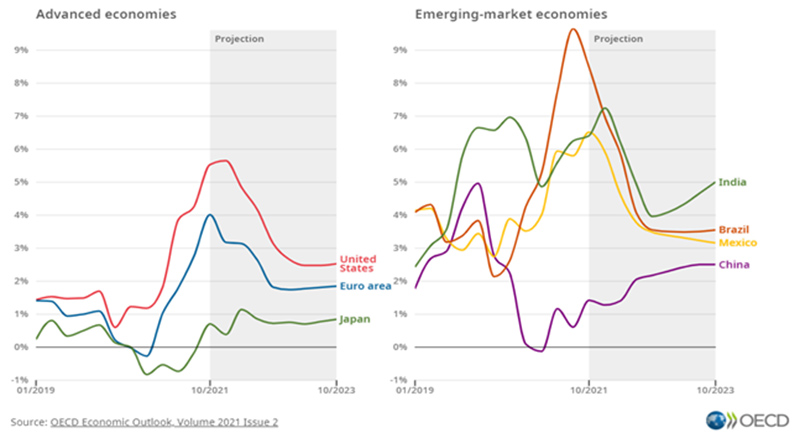The Organisation for Economic Co-operation and Development (OECD) published the latest issue of their Global Economic Outlook report on 1 December 2021. Sub-titled A Balancing Act, the report analyses global vaccination efforts and economic policy responses to the coronavirus outbreak, and the economic outlook globally, and by country.
The report includes an extended discussion of the prospects for global inflation under the section on Key risks and vulnerabilities. The OECD warns inflation may remain higher than forecast as the timeframe for supply-chain bottlenecks, energy prices, and transportation costs to ease, which have contributed to global inflation, remains uncertain. The OECD projects inflation to peak in the coming months but remain above pre-pandemic levels across their forecast period. For example, United States (US) inflation is forecast to return to a level one percentage point above those recorded prior to the pandemic. Australian inflation, which recently reached a 3.8 percent annualised rate in June 2021, is forecast by the OECD to be 2.7 percent over 2021 and 2022, falling to 2.1 percent in 2023.
Chart 1: OECD projects inflation to peak in late 2021 and remain above pre-pandemic levels (inflation rate, % year-on-year)

Source: OECD, Global Economic Outlook 2021: A Balancing Act, December 2021
To illustrate the connection between supply-chain disruptions and inflation the OECD provides a discussion of the global car industry. Component shortages, including semi-conductors, have led to a fall in global production despite strong demand globally for new cars. The shortage of new car production has contributed to a spike in used car prices, contributing to recent high inflation rates, particularly in the US.
Chart 2: OECD shows global car production and sales are declining

Source: OECD, Global Economic Outlook 2021: A Balancing Act, December 2021
The OECD forecasts for Australian economic growth have been revised since the last Global Economic Outlook report, in May 2021, given the impact of lockdowns in major Australian cities. Real Gross Domestic Product (GDP), an economic measure of the volume of goods and services produced in the economy, is projected to grow by 3.8% in 2021, 4.1% in 2022 and 3.0% in 2023. The revised outlook forecasts a lower level of economic activity persisting over the next 12 months compared to the May 2021 forecast. The fall in GDP recorded in the September 2021 quarter means that growth rates over the next three quarters have been revised upwards to reflect the unwinding of lockdown measures.
Chart 3: OECD GDP projections for Australia from current and recent Global Outlooks

Source: OECD, Global Economic Outlook 2021: A Balancing Act, December 2021
The projected growth rates for Australia are slightly lower than projections for world and G20 growth, reflecting in part the smaller fall in Australian GDP since the onset of the coronavirus outbreak relative to the global economy (Chart 3).
Chart 4: OECD Real GDP growth projections

Source: OECD, Global Economic Outlook 2021: A Balancing Act – Chief Economist’s editorial, December 2021
Each issue of the Global Economic Outlook includes a Statistical Annex that covers over 60 major economic indicators, including GDP growth, inflation, and international trade, available as a series of spreadsheets or as a complete pdf document. This provides an overview of the national economic data compiled by the OECD, and a portal to see how Australia compares to other OECD member states on these economic indicators. Alternatively, the OECD Australia portal provides a gateway to the OECD’s data and publications on Australia, including the more comprehensive Economic Survey of Australia.
The Parliamentary Library can assist parliamentary clients in sourcing, accessing, and analysing OECD data and publications.